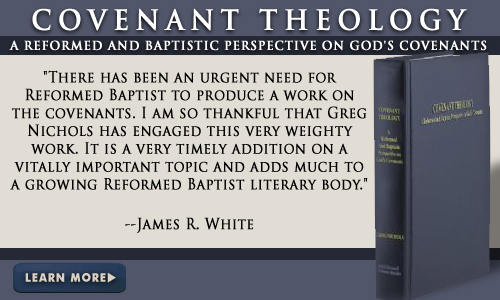Covenant Theology: A Reformed and Baptistic Perspective on God's Covenants by Greg Nichols
/ My first study Bible portrayed the flow of redemptive history under the rubric of changing “dispensations.” This approach helped me to appreciate the progressive nature of special revelation. But the more I studied the Scriptures, the less correspondence I sensed between the biblical text and the dispensational scheme in the accompanying notes.
My first study Bible portrayed the flow of redemptive history under the rubric of changing “dispensations.” This approach helped me to appreciate the progressive nature of special revelation. But the more I studied the Scriptures, the less correspondence I sensed between the biblical text and the dispensational scheme in the accompanying notes.
Then I was introduced to an older way of viewing the flow of redemptive history that employed “covenant” as the organizing category. This approach gave me a greater appreciation for the underlying continuity of special revelation. It also seemed to follow the contours of Scripture better than the dispensational approach. Nevertheless, I couldn’t reconcile certain facets of this older “covenant theology” with some of the Scriptural data.
Then I had the privilege of hearing Greg Nichols lecture on the biblical covenants. Instead of simply beginning with the categories of the older covenant theology, Greg has made an inductive study of all the relevant biblical data his starting point. He has collated that data in a manner that does greater justice to both the continuity and also the discontinuity of special revelation. The end result is a revised and improved version of covenant theology with a stronger exegetical foundation and more consistent theological formulation.
As one of Greg’s former pupils and present colleagues, I’m delighted to see the fruit of his labors finally reach the printer’s press. Greg’s study doesn’t merely tie up some of the loose ends left by older covenant theologians. It offers its own unique contributions. For instance, while noting an organic unity that binds all the divine-human covenants, Greg distinguishes between covenants God makes with “righteous servants” and covenants God makes with “saved communities” (i.e., the righteous servant’s offspring). He also marshals exegetical evidence for a divine covenant with Christ that is distinct from the pre-temporal “covenant of redemption.” This “Messianic Covenant” functions as the historical counterpart to the “New Covenant,” which God makes with the Righteous Servant’s (spiritual) offspring.
The reader will encounter other distinctive contributions in this study. Whether or not he finds them all equally compelling, I’m confident he’ll gain a greater appreciation for God’s unfolding plan of salvation as revealed in “the covenants of the promise.” And I know that nothing would give Greg more joy than fostering in God’s people a greater admiration for the riches of God’s glorious grace.
Bob Gonzales, Dean
Reformed Baptist Seminary











